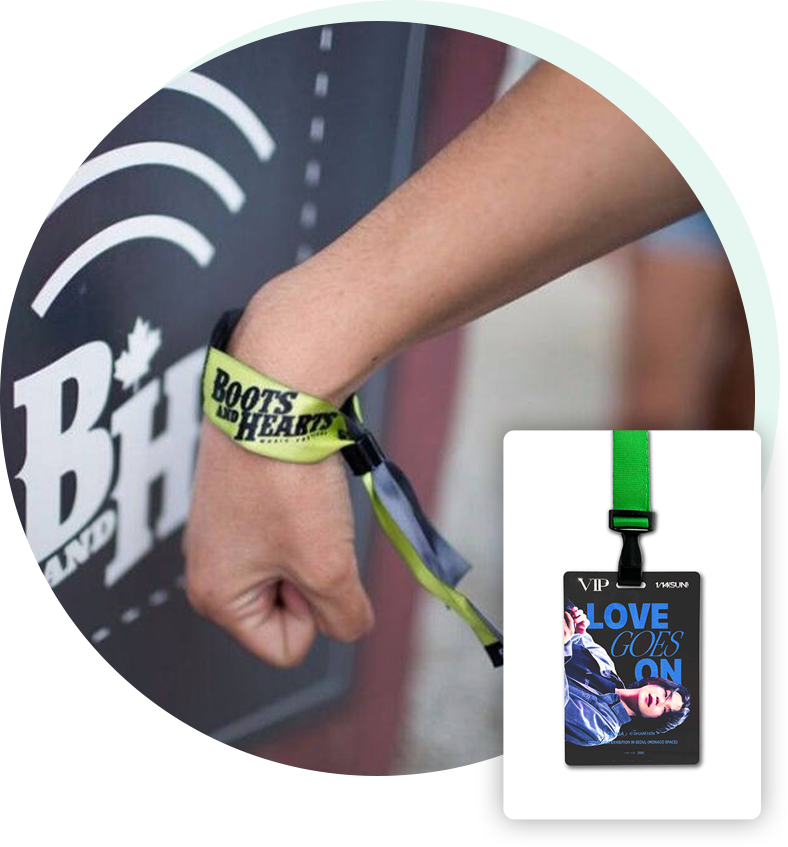RFID (Radio Frequency Identification) wristbands have become a game-changer in the event industry, offering seamless and efficient solutions for both organizers and attendees. Whether it's a large-scale music festival, corporate event, or even a luxury hotel experience, RFID wristbands are rapidly replacing traditional methods like paper tickets and access passes. But how do they work, and what benefits do they offer for event management? Let’s dive into the technology and explore why RFID wristbands are becoming essential for modern events.
RFID technology uses radio waves to transmit data between a tag and a reader, without the need for direct contact. An RFID wristband contains a small chip (the tag) embedded with a unique identifier. The chip is linked to a system that can store various types of data, such as access rights, payments, or even personal information. When the RFID wristband comes into the proximity of an RFID reader, the chip transmits its data, enabling quick and accurate identification.
There are three main types of RFID tags: passive, active, and battery-assisted. Passive RFID tags are the most commonly used for wristbands, as they do not require a battery and derive their power from the reader's signal. These are ideal for large-scale events where a cost-effective solution is necessary. Active RFID tags, on the other hand, have an onboard battery and can transmit signals over longer distances, typically used for tracking purposes in specific applications.

One of the standout advantages of RFID wristbands is their ability to store and transfer data without the need for physical contact. Unlike barcode wristbands, which need to be aligned correctly with a scanner, RFID wristbands can be read from any angle and at a distance. This flexibility makes them more convenient and efficient for high-traffic events, where speed is crucial.
The RFID wristband's unique identification number allows for multiple functions:
Access Control: The wristband grants users access to specific areas, such as VIP zones, backstage, or restricted sections, depending on the data encoded in the tag.
Cashless Payments: Attendees can link their wristbands to a prepaid balance, allowing them to make quick, secure purchases at the event without needing cash or credit cards.
Data Collection: RFID systems can track attendee movements, providing real-time analytics that help organizers optimize event logistics and improve the overall experience.
RFID wristbands offer robust security compared to traditional tickets or paper passes. The data stored on an RFID tag is encrypted, making it difficult to counterfeit or tamper with. This significantly reduces the risk of fraud, such as ticket scalping or unauthorized access.
At large events, managing thousands of attendees efficiently can be a logistical nightmare. RFID wristbands simplify this process by allowing for rapid, hands-free check-ins. Event-goers simply scan their wristbands at entry points, drastically reducing wait times and enhancing the overall guest experience. This seamless entry process also contributes to improved security, as the system can verify each attendee’s credentials instantly.
One of the most compelling reasons to adopt RFID wristbands for events is the convenience of cashless payments. Attendees can load funds onto their wristbands ahead of time or on-site, eliminating the need for physical cash or cards. This streamlined payment process leads to faster transactions, reducing long queues at food stalls or merchandise booths. As a result, event organizers often see increased sales, as attendees are more likely to spend freely without the hassle of carrying cash.
RFID wristbands create a frictionless experience for event-goers. They no longer need to carry tickets, wallets, or passes; everything they need for access and purchases is contained in a single, lightweight wristband. The added convenience and speed also contribute to higher attendee satisfaction, making RFID wristbands a crucial tool for enhancing customer engagement.
RFID systems generate a wealth of data that can be invaluable for event organizers. By tracking attendee movements, purchasing behaviors, and time spent in specific areas, event planners can gain detailed insights into what works and what doesn’t. This data can be used to optimize event layouts, improve marketing strategies, and even inform future event planning.
RFID wristbands offer new opportunities for sponsors to engage with attendees. Event organizers can integrate sponsor branding directly onto the wristbands, creating a unique advertising platform that is constantly in view. Additionally, real-time data collected through RFID systems allows sponsors to better understand attendee preferences and tailor their offerings accordingly.
For attendees, RFID wristbands offer a host of advantages that improve their overall event experience:
No Need for Cash or Cards: With cashless transactions, attendees can make purchases effortlessly, freeing them from the need to carry wallets.
Faster Access and Shorter Lines: RFID wristbands speed up entry times and reduce queues at bars, food stalls, and ticketing booths, allowing attendees to spend more time enjoying the event.
Personalized Experience: Some RFID wristbands can store personalized information, such as age or VIP status, allowing for a more tailored experience that can include special discounts or exclusive access.
RFID wristbands are quickly becoming an essential tool for event organizers looking to streamline operations, enhance security, and improve the attendee experience. By offering benefits such as faster access, cashless payments, real-time data analytics, and increased revenue potential, RFID wristbands are transforming the way events are managed. Whether for music festivals, corporate gatherings, or VIP experiences, RFID wristbands offer a modern, efficient, and secure solution that meets the demands of both organizers and attendees.
As the technology continues to evolve, we can expect even more innovative applications for RFID wristbands in the event industry, making them a must-have for any event organizer looking to stay ahead of the curve.
Do you need a professional team to provide you with solutions? Contact us for a quote
Let us discuss it with you.